#the entire point of the cycle-breaking narrative is that the new generation has broader and more compassionate vision
Text
I'd Do Anything (... But I Won't Do That)
This started out kind of weird and petty but then turned into an actual thing about the relationship of Viren's character arc(s) to the Arc 2 "I'll do anything for you" theme, because that's actually pretty important for the context of how both Callum and Claudia will have to confront the same conflict.
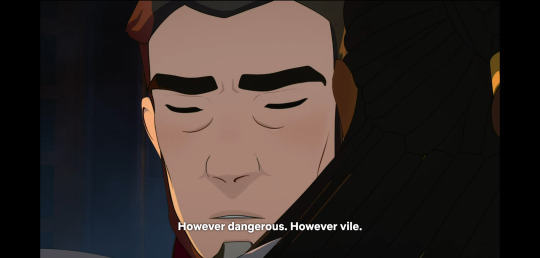
Pictured: Do NOT take a shot every time we get a callback to this line, you will die.
Basically, the petty part is that I think evaluating Viren's Arc 1 decisions through the "I will do anything for my family" lens is... disingenuous is too strong a word, but maybe simplistic? The "Viren doesn't reveal/offer the egg to save Harrow's life because he's too preoccupied with hanging on to his own power" take has never sat right with me because the real core problem of Viren is a lot more complex than just "he's lying (to himself)," it's a whole pattern of denying his own agency in doubling down on his mistakes. He'll make one bad/selfish decision, and it becomes a cascade of subsequent actions that he sees as being unavoidable, but that aren't necessarily even informed by the same reasoning or values as the initial decision. Like everything else in Viren's dream, Kpp'Ar's take that his choices are all oriented toward power is both accurate and not necessarily as literal as it seems.
Because, like... Viren's not actually a manipulator or even much of a planner—he's a very skilled opportunist. That's why all his choices wind up being based entirely on the context of past choices, and frequently make no sense when you look at them from a "hey buddy, where exactly do you think you're going with this" angle. It also contributes to why he's so desperate for control all the time, in that he acts primarily in a reactive way rather than proactively, which is always an inherently less secure position.
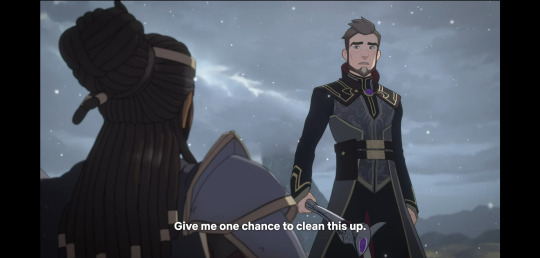
Pictured: The kind of statement that definitely always leads to things going super well.
Even taking the egg in the first place is a reactive decision—not that he doesn't make a choice there, or that he doesn't choose power over the threat he believes the egg poses, but he did actually walk all the way up the Storm Spire, fight five or six Dragonguard, and get kicked down a flight of stairs with the intent of destroying it. He didn't argue with Harrow about destroying it while secretly planning to take it for himself. He only even thinks of it as a weapon because Tiadrin planted the idea in his mind—as an opportunist, the temptation to leave an avenue to power open rather than close it off is what he can't resist. He sat on Sarai's last breath for ten years waiting for a chance to weaponize it to maximum effect, he can sit (figuratively... or literally, I'm not gonna stop him) on the egg for as long as it takes for an appropriate use it to appear. Tiadrin even specifically encourages that he not "waste" it, both specifically by destroying it now, and implicitly by using it too quickly and foolishly.

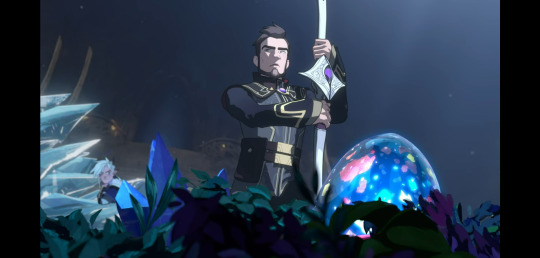
Pictured: Smart mom, dumb ass.
Tiadrin's angle, of course, is that the longer Viren hangs on to the egg without actually using it, the higher the chance it can be recovered. She doesn't know that Viren will leave things in a state where the assumption is that the egg was destroyed, meaning no one will think to try recovering it, but that's not really her fault and it still pays off.
The gamble Viren makes, on the other hand, is that the opportunities the egg affords will be worth the risk of it somehow falling back into Xadian hands. If the egg returns to Xadia alive, he's back to square "his name will be vengeance" in the game of We Killed the Dragon King. So yeah, you could say Viren values keeping the egg over Harrow's life, but in doing that he's actually operating largely on the exact same values and beliefs that made him argue for destroying it in the first place. It's just that his prior choice of risking humanity's security for the sake of potentially world-altering power has backfired in the context of an immediate and direct threat to Harrow's life. Really, the entire rest of s1 and s2 are him doubling down specifically on keeping the egg from returning to Xadia while also milking the opportunities coming from that course—e.g. the egg cannot go back to Xadia, therefore Callum and Ezran cannot return to Katolis either with or without it (knowing their goal is to return it to Xadia, which it will be difficult to stop them from doing once Ezran is king), and that means someone has to take the throne. If the egg can't be recovered, their only hope is a decisive first strike against Xadia, so someone has to mobilize the Pentarchy immediately. None of them are things he planned in the sense of "well, if Harrow dies then I can get his sons out of the way and make myself king, and then conquer Xadia." It's all reactive to the situation with the egg. You could argue that he'd do the same things if the egg wasn't a factor, like it's possible he's always been kind of lying in wait to push Harrow's sons aside and seize the throne... but if that was the case, he'd really do much better to make a bid for regent like any normal evil advisor would.
Anyway, all of that does still undermine the statement that he'd do "anything" for his family (which includes Harrow), and it is ultimately because of that initial choice he made to take the opportunity of power over the certainty of securing humanity's future. It's just not as simple as, "Viren says he would do anything for his family, but he won't sacrifice his own power and ambition." In the wake of his critical failure to prioritize humanity in destroying the egg, he's making choices that do prioritize humanity (from within his worldview that Xadia is an existential threat barely held at bay)... but they're still bad choices because they're all reactive to that original bad choice. It's not that he's working at cross-purposes to what he says his goals are, it's that he genuinely thinks digging his hole deeper will somehow work out positively, or at least better than the alternative would.

Pictured: Another statement that for sure indicates you're doing totally great.
Really though, I don't think you can (or are supposed to) look at the trifecta of self-individuals-world and point to one that Viren—or really any character outside of Callum, Rayla, and Claudia—puts at the top. Part of the whole point here is that elevating one of those at the expense of the others is never going to be the right choice all of the time. Obviously always putting yourself first is shitty, but we get multiple examples of over-prioritizing one of the other two as being self-destructive and dangerous. Consistency isn't supposed to be positive, here—a core part of this arc is likely to be Callum grappling with that, and that's without even looking at what's going on with Claudia.
The other thing is that "I will do anything for my family"-Viren is actually on some level a different character than Arc 1 Viren, such that evaluating one based on the context of the other doesn't actually make sense. We don't get even a hint of the "I would do anything for my family" in the series until s4, after Viren has died and been revived. Yeah, we had it earlier in the novels, but in there it's really about Claudia and her relationship with Viren, not Viren's values or actions. Arc 1 Viren and Arc 2 Viren inform each other as characters, but most of the point is the ways they aren't the same. And while Arc 2 Viren is understandably preoccupied with the concept of sacrificing for family—given that he's been stripped of everything that was in his life except Claudia, who went to terrible lengths on his behalf—Arc 1 Viren is actually quite consistent with how he's laid out in his Tales of Xadia character sheet:

Like, check out those Liberty and Glory statements—not even close to the same ballpark as Callum's "I value those close to me more than anyone or anything" Devotion and "I'm beholden to my inner circle, not some silly kingdom" Liberty, but quite accurate as the through-line on his s1-s3 actions. There's nothing in there about family, because Arc 1 Viren isn't actually meant to be associated with "I will do anything for my family," and he's not lying to himself by not acting consistently with it in Arc 1.
Arc 2 Viren is then a kind of emotional reboot back to a particular point earlier in his life—not necessarily the point before he first did any dark magic at all, but before he did his ill-defined "anything" to save Soren, which is implied in multiple places to be the point where he started in on a spiral that had tangible and fairly rapid effects on his personality and outlook. That's further emphasized by the contents of his dream in s5—seeing him behave in a genuinely loving and joyful way with Soren is shocking, and immediately raises the question of what the fuck happened and why.
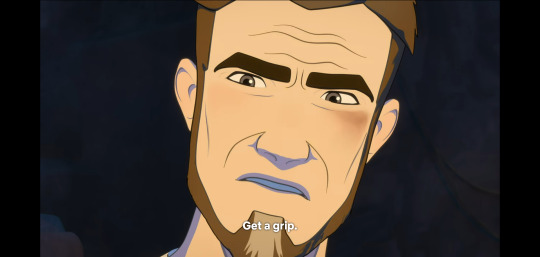
Pictured: Healthy coping mechanisms.
Part of what still distinguishes Viren's "I will do anything for my family; however dangerous, however vile" from Callum's developing "I would do anything for you" is that Viren is always deliberately addressing the "things that are so unforgivable, you will never forgive yourself" facet while Callum leaves it implicit because he doesn't really understand and/or want to acknowledge that yet (and also Rayla would probably twist his nose again, which fucking hurts). In how Viren describes it to Terry, he is using that up-front acknowledgement to then essentially abdicate any emotional responsibility for... well, anything at all. The entire "however dangerous, however vile" mantra is another way of denying his own agency, because if he'll do anything, then he doesn't actually have to go through the difficult emotional process of making those decisions and dealing with the aftermath.
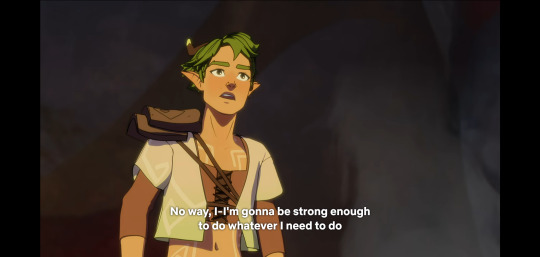

Pictured: H-healthy coping mechanisms?
Terry correctly pegs this questionable excuse for philosophy as "not having feelings," and generally not the best approach, because it will do things like lead to a default state of emotional unavailability to your children—oh, wait. I think it's not unlikely that Viren's emotional distancing from what "I will do anything for my family" meant contributed a lot to the degradation of it as his core value and his ensuing Arc 1 state. A lot of what's going on in his s5 dream is that he's being confronted with the consequences of "I will do anything for my family," specifically. He's being forced through an emotional speedrun of what it has cost him and everyone around him, and what has he got to show for it? Claudia, corrupted beyond recognition, proudly repeating his own words back to him.

Pictured: Whatever the opposite of daddy issues is.
Because the whole point of Viren's "I will do anything for my family" in Arc 2 is the challenge of whether he would/will do it all again. If he holds to that value the same way he did before, he'll do whatever it takes to save Claudia—however dangerous, however vile. Most of Viren's moral and emotional stuff has been based on his self-serving resignation to having "no choice." He's so tragically trapped in a chain of spiraling consequences he can never break... except oh wait, he totally can. S5 is all about Viren recognizing the dark magic feedback loop and that he has the agency to break it, and his best and only chance to avoid doing further harm to Claudia is to not be willing to destroy himself that way again, even it it means his death will cause her terrible emotional pain.
We'll see how that works out. Because let's be real: Claudia's gonna Claudia, regardless. However it goes, there's an important narrative precedent being set for both breaking free from dark magic/Aaravos and evaluating the "I will do anything for you" impulse in a more nuanced way.
#the dragon prince#viren#thanks for coming to my petty TED talk#also like... do not even pretend that handing over the egg would have worked#or even more emphatically that VIREN would ever have considered handing over the egg as something that would work#the entire point of the cycle-breaking narrative is that the new generation has broader and more compassionate vision#while the old generation is stuck in The Cycle(tm) and therefore incapable of making OR accepting that offer#it would not just be wildly out of character but literally antithetical to the narrative itself for Viren to think it's a viable possibilit#kradogsmeta
57 notes
·
View notes
Text
“Westworld III” takes several steps forward...and several steps back (REVIEW)

Created by Jonathan Nolan and Lisa Joy
Starring: Evan Rachel Wood, Jeffrey Wright, Aaron Paul, Ed Harris, Vincent Cassel, Tessa Thompson, Thandie Newton
(SPOILERS AHEAD)
Season three of HBO’s “Westworld” cleans up many of the issues season two had but ultimately falls short of season one’s loftier thematic ideas.
It’s cinematically sharper, it’s about as well paced and fun as the show has ever been and that on it’s own makes it worth watching and certainly worth continuing the series going forward but for fans hoping it might have something new to say in the vein of its hyper meta-textual and thematic commentary of the first season it may leave you disappointed.
Season three may have raised the stakes of the series with its pending (and frankly, all too timely) apocalyptic vibes going on in the story but it lowers the bar on its cerebral nature opting more for fast paced thrills over anything more profound or hadn’t said already.
That said, I can’t say I didn’t enjoy it anyways for better…and worse.
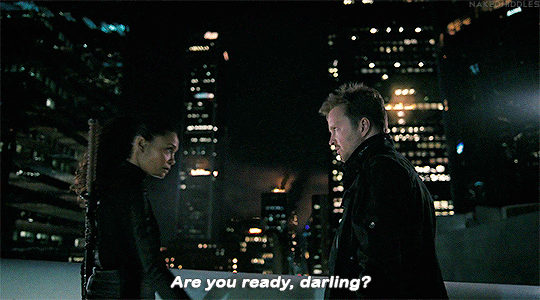
“Westworld” season three picks up not too long after the events of season two as Dolores has infiltrated human society and begun working on her master plan to bring it all down. She has spared Bernard, who now spends his life as butcher outside the major cities but he often wonders where she is and when this apocalypse will begin. Meanwhile a veteran named Caleb spends his life doing the same mundane tasks and mercenary work everyday to make ends meet pondering his existence as he deals with his PTSD. He decides to break the cycle however when one day he finds Dolores shot in an alleyway and joins her on her quest to start a revolution.
“Westworld” is one of the few series that hooked me immediately with its first episode.
Where some series take their time to gain momentum before going into overdrive in their season finale, season one’s “The Original” grabbed my attention from the start with a combination of mystery, action, stellar acting, and the kind of cerebral humanist story-telling I expect and want from the cyberpunk genre.
As someone with a father who talked extensively about myth, theme, and got me to listen to old Joseph Campbell essays on CD growing up, a series that explored story-telling on a meta level with a high octane LARP concept setting was everything someone like me could ask for in a science fiction series.
youtube
(Seriously, there was some compelling analytical story-telling dialogue in this series.)
So invested I was in this tale of synthetics gaining agency and humans exploring their own personal myth-making and what it said about themselves made me a huge fan early on, proudly proclaiming it to be the best show on HBO several years ago.
I was so certain this series was creatively the best thing on television at the time that I strongly considered getting a maze tattoo like that in the show to proclaim my brand-new fandom.
But knowing there was still more seasons on the horizon, I held off thinking I should probably see this through before doing anything that brash.
Well, a few years later I feel pretty good about that decision…
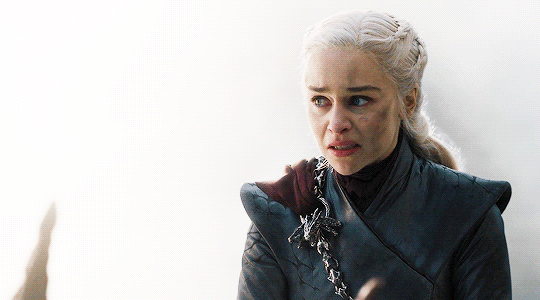
(Imagine how fans who named their newborns Daenerys or Khalessi feel right now...)
I remember thinking at the end of season one “Where can they possibly go from here still? Other LARP destinations in this cyberpunk world? A robot vs human war? How can the world expand?”
The problem is these thoughts did not really ask the most important question following that first season; “What more does it actually have to say?”
The first season is, in my opinion, a perfect season of television. It’s a brilliant take on the stories we tell ourselves, the choices we make that define us in our personal myths, and the exploration of our nature and how that relates to choice all while playing out this synthetic mystery plot. The entire first season pulls all these arcs and ideas together through characters like Bernard/Arnold, William/The Man in Black, and of course Dolores. They all, more or less, complete their arcs in that first season and there’s not really much needed to be said beyond that when you really think about it. If the series ended on Dolores murdering Ford and the Delos guests in the season finale that honestly would have been a perfect ambiguous ending to send the story off on.
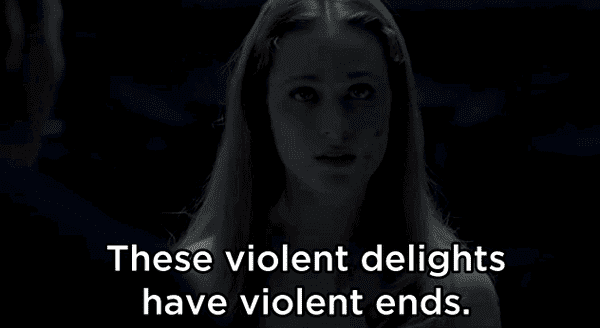
(Kind of itss own meta commentary on the journey of a fan and an ever-increasingly cynical series...)
But because this is HBO, and “Game of Thrones” is no longer the driving force of premium TV, Westworld MUST continue because it’s the new cash cow for the channel. Whether or not writer/producers Lisa Joy and Jonathan Nolan really knew what they wanted to do following that first season is anybody’s guess but it’s hard not to see that they have struggled a bit since that point.
Season two is a mixed bag, where the characters literally feel like they’re going in circles. Plotlines get muddled, characters become hyper versions of themselves, and while certain ideas and episodes reached similar levels of brilliance that the first season had it still lacked the narrative sharpness of the first season and that has a lot to do with the characters having mostly no other driving force besides survival and simply getting to the next physical plot point.
It just didn’t have much more to say and frankly in a story about stories that’s pretty damn important.
youtube
(This episode from season 2 is still one of its best.)
To their credit, Joy and Nolan appear to rectify quite a few issues season two had with season three. Again, it’s faster, better paced, there’s a clearer destination at the end for its characters and not to mention a pretty compelling villain for this season’s plot in Serac played by the brilliant Vincent Cassell.
But it suffers ultimately the same problem; it has nothing truly new to say.
This is not to say the season is without any meaningful messages or metaphors. It’s quite critical of our hyper surveillance and information gathering state, might even be the best depiction to date on the broader implications and consequences of a world where we all have our personal information readily online to mined and plundered by big businesses and government. Caleb, played by the always great Aaron Paul, is a good avatar for the everyman who has grown jaded and disenfranchised by this system. Though he spends most of the season looking overly shocked and gape-jawed at just about everything, it’s hard not to feel empathy and a connection to this character as we are quite literally living in a bit of a cyberpunk hell as it is these days and treated just as much as expendable commodities right now.
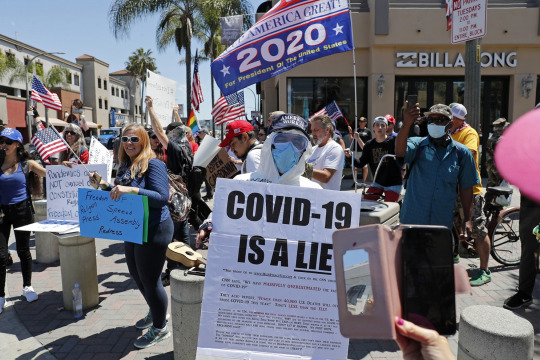
(You fucking jackasses are arguing for the wrong things! You’re all being swindled and cheated for nothing! *photo “unrelated”*)
The season is generally best when the focus is on him, as the first episode delivers a strong start in the same way season one did.
Where the season begins to fall apart though is when quite literally the world “Westworld” inhabits begins to do so itself. Serac’s Rehobaum, which reminded me just a little too much of “Hitchhiker’s Guide to the Galaxy’s” Deep Thought, releasing all its data to the world and everyone discovering they’re basically all dangerous assholes is almost hilarious to me.
Though the idea of hyper data controlling our every move is a good cyberpunk metaphor to jump off of, the way this bit is executed is a little over exaggerated and clumsy.
youtube
(Though it does deliver a pretty powerful scene regardless.)
This isn’t actually a tremendous problem with season three, but it doesn’t do much to add to what we already understand about the story; which is how narrative controls us and how important choices and free will is to that. All this is already told and expanded on in the first season through Dolores, all season three does it bring it to a macro level and put that onus on the humans instead of the hosts. The hosts were already a metaphor for humanity anyways so again the story in some ways hasn’t changed much since season one.
It's interesting to have the narrative of the hosts turned on the humans but thematically it feels redundant.
I’ll add that this isn’t the worst idea they could’ve gone with, it works in moving the physical aspect of the story forward for sure, and I wouldn’t even classify it as a bad one, but again the problem is the story has largely run out of new things to tell us.
We like stories because we want to learn some truth about ourselves, whether we want it to or not, and Anthony Hopkins’ Ford makes a great point of this in season one. This has been the purpose of myths and legends since the dawn of time and it’ll be no different even when the 37th Fast & Furious comes out in 40 years. You could argue that the message of Westworld deserves repeating or that it’s not important to the entertainment value it still provides, and you might be right. But for a series like this, that is so invested in what stories mean I don’t think it’s wrong to think there should be more to it than this.
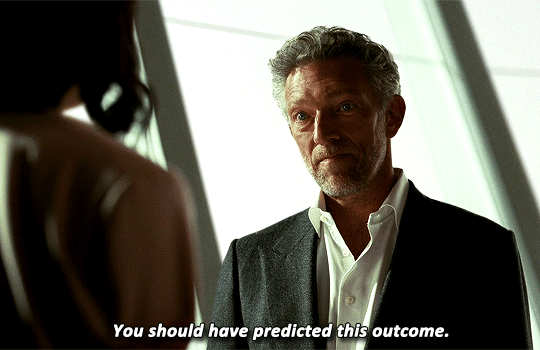
(Maybe, I should’ve...)
Of course, there’s still plenty more to see out of “Westworld” for the foreseeable future as HBO won’t be canceling it anytime soon and certainly it’ll have its chance to still tackle more ideas and themes in the future but, at this point at least, it’s been less meaningful that its first season.
There are other problems too, namely Dolores constantly changing and unclear revolution plans and arcs resolved offscreen, certain side plots with other characters ultimately going nowhere, and a fairly predictable twist with Caleb, but this is the crux of the problem with the series as it stands now and the one worth mentioning the most.
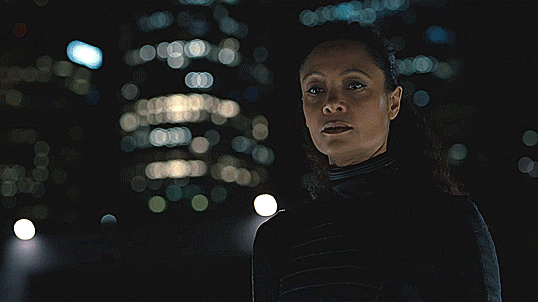
(And Maeve, *sigh* oh Maeve...)
That said, season three really is a lot of fun despite my issues with the narrative. The pacing, as mentioned, is great from start to finish. I was never bored or disinterested during this season, despite its flaws, and the action bits are frankly better than they’ve ever been as the series goes full cyberpunk in parts with great robot on human and robot on robot action.
The cinematography is sharp and striking too as Jonathan Nolan shows he’s definitely Christopher’s brother with some beautiful, haunting shots of the future Los Angeles city Gotham-esque skyline set to Ramin Djawadi’s excellent cyberpunk score that gives the new season a more noire-ish feel that would make Vangelis and Hans Zimmer proud.
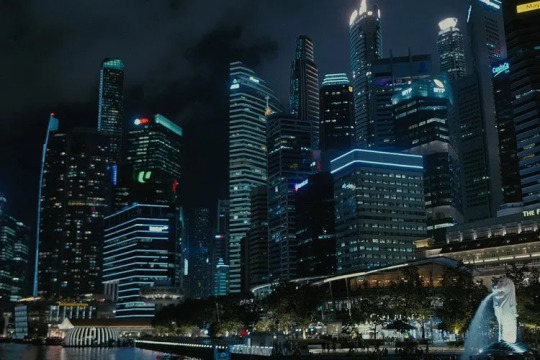
(In the future Los Angeles will be Singapore!)
The acting is still stellar of course. Though Jeffrey Wright’s Bernard is largely wasted in this season and his plot goes nowhere, his scene with Gina Torres in the finale is touching. Luke Hemsworth is dry as hell in a good way as Chief of Security turned personal buddy bodyguard to Bernard as Ashley Stubbs. Ed Harris is wicked and dastardly as always as William and of course Evan Rachel Wood is solid as the driving force of the series as Dolores.
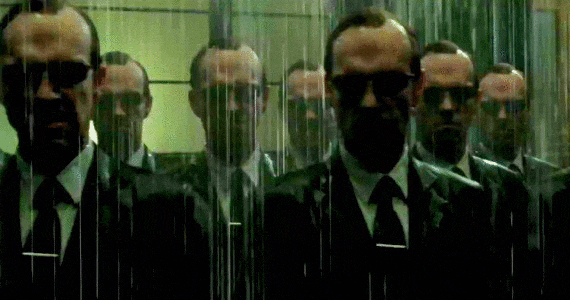
(Out of context season 3 spoiler.)
The finale doesn’t leave much to say beyond a pending machine vs human war though which has been building up since the first season anyways. While I can see some possibilities for an interesting direction here, I can’t say I’m as intrigued as even the finale to season two left me.
In some ways, season one left me not too much unlike William going into season’s two and three; looking for additional meaning in something that wasn’t looking to tell me anything deeper, at least right now. Perhaps the maze just isn’t for me anymore but moving forward I’ll be lowering my expectations.
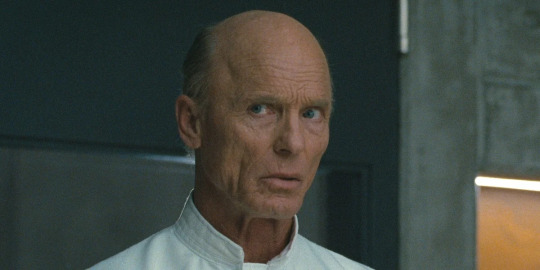
(Oh my God! Meta commentary on meta commentary! It’s meta-ception! I’m beginning to question the nature of my reality!!!)
“Westworld” remains a fun cyberpunk action series that can hold your attention span for an hour, and I think it’ll maintain that energy consistently going forward, but it might’ve been best left where it was when Dolores put a bullet in Ford’s brain.
I do hope it can regain some of its original spark at some point but until then…it doesn’t look like anything (deep) to me.
VERDICT:
3.5 out of 5
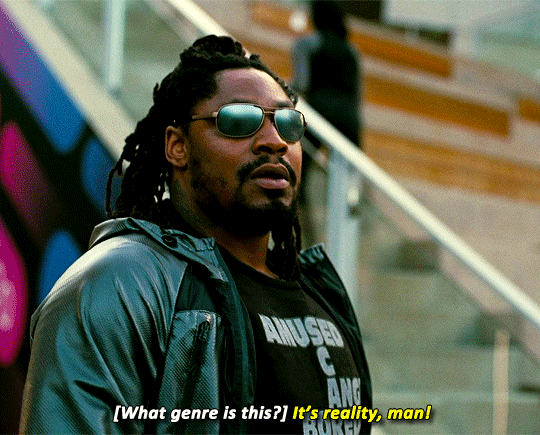
You said it, Marshawn...
#Westworld#West world#Westworld III#Westworld season 3#Westworld season 2#evan rachel wood#Ed Harris#Jeffrey Wright#aaron paul#Breaking bad#movie#film#TV#review#Westworld review#Christopher Nolan#Lisa Joy#Jonathan Nolan#michael crichton#HBO#Game of Thrones#daenerys#Marshawn Lynch#jimmi simpson#narrative#story#myth#legend#joseph campbell#Tessa Thompson
20 notes
·
View notes
Link
Reflexive and amoral avarice is one of the ignoble truths of Trump, but it’s subsidiary to the most important and elemental fact about the man, which is that he never does or says anything new. Some things may be shaded slightly differently from one blurt or boast to the next... but such slight variations of narrative form don’t alter the fundamental message... a running litany of shape-shifting grievance... that centers and celebrates the solitary genius of the narrator at the expense of a cultural and political establishment... bent on mocking, belittling, and victimizing him. The bigger story never changes, because Trump cannot change.
[...]
The power Trump fondly imagines that he wields... is it at bottom just... impressiveness. It’s that power, in Trump’s own twice-told tales of titanic achievement, that unlocks all the others... The thing about impressiveness, however, is that it resides entirely in the eye of the beholder... and in Trump’s case, he typically invokes it in a crass gambit to annex and manipulate... that beholder’s eye and generate maximum ego-gratification for himself. As with most things Trump-related, the form that this ascriptive impressiveness takes can be mapped with laughable ease over whatever failing he is most keen to conceal at that moment.
[...]
For many years... Trump lived in a strange public inversion of the usual superhero routine. His secret identity as a witless and grandiose scam artist was widely known, while his identity as an Extremely Impressive Person was known only to himself and a few loyal retainers. The Apprentice certainly helped restore his status, but it took the work of the political media to reveal Trump’s actual superpower.
[...]
To hear the... media tell it, Trump’s signature power is the ability to change the subject. With just a strange flutter of his pale eyelids and a difficult-to-parse ad-lib, Trump can swing a news cycle away from his latest lurid failure and back in the direction he wants it to go... This seems to give Trump entirely too much credit.
[...]
At this stage in his sublimely unexamined life and increasingly evident cognitive decline, Trump isn’t really capable of... compelling misdirections or even passably convincing falsehoods. He digresses because he loses the plot, and he lies when the truth wouldn’t look good on him. He distracts himself and tells himself lies because it is the only way to square what is actually happening with what he would prefer to be happening.
[...]
Where the media has failed and continues to fail is in its insistence that Trump is doing all of this, or any of it, for the same reason that other politicians are understood to have aimed to distract or chosen to lie.
[...]
A series of long-standing procedural and political and discursive norms... have failed the essential challenge that Trumpian politics and Trump’s own bulletproof shamelessness present. But the steepness and rapidity of their fall raises some serious questions about just how sturdy they were to begin with. The spectacle of expert analysts and thought leaders parsing the actions of a man with no expertise or capacity for analysis is the purest acid satire.
[...]
Trump represents an extraordinary challenge to political media precisely because there is nothing here to parse, no hidden meanings or tactical elisions or slow-rolled strategic campaign... There is nothing artful or concealed about Donald Trump, which is one of the secrets of his strange success as a politician. His lies are preposterous and glaring and never anything but the obvious opposite of what is actually true... The sheer mass of his annihilating selfishness leaves no room for anything like subtext. Trump is nothing but what he appears to be, and his superpower comes from this. His superpower is getting upset.
[...]
A wealthy dullard with what he perceived to be a divine right to the admiration, and grateful deference, of others... Trump picked his enemies not wisely but too well... and found himself hooked on Twitter... because he wanted to make himself look impressive and happy, and... because he needed to destroy anyone and everyone who’d ever made him look or feel less so.
[...]
Years before he became something like the subject and object of virtually all the programming on Fox News and Fox Business, Trump tweeted his takes on the celebrity gossip he gleaned from Entertainment Tonight and Access Hollywood with the same energy that he now brings to his regular morning ritual of transcribing Fox & Friends for his online followers... As Trump’s viewing diet shifted... his act soured and sharpened in turn.
[...]
The relationship between the president and his television channels has become... overtly recursive. Trump watches people talk about him on Fox, filters what they’ve said through the damp wool of his brain and repeats it, and then watches himself saying it on television later that day. As president, Trump has routinely sought the counsel of various Fox News personalities.
[...]
The politics of Fox News are reactionary, but they are also hard to pin down. They are about a feeling, a combination of distaste and distrust for all the things that other people are getting away with and seem so entitled to out there. This hunched and feral posture of grievance is then combined with a fiercely put-upon impatience with the service that viewers themselves are receiving... Even their defense of Trump is grounded in how he is being betrayed or treated unfairly.
[...]
Someone who spends eight or ten hours a day bathing in it could not by any rights be considered informed. That’s not really the point, and not remotely the business model. The idea is to keep viewers hanging around through the commercial breaks, to keep them engaged and enraged enough to continue watching and just frightened enough to believe that they’re better off staying indoors.
[...]
It’s true that the broader Fox project was always to make those viewers... receptive to conservative politics. But the actual election to the presidency of a Fox News addict whose understanding of politics is shaped wholly by the television he watches and his own legacy grievances and biases presents a different suite of challenges. Trump’s towering incuriosity and impatience with other people have ensured that, despite having a massive intelligence-and-policy apparatus at his command, he continues to get most of his information from his television. Fox News’ editorial policies have ensured that he believes politics to consist of three separate and equally important parts: tax cuts, wars, and elections
[...]
This is only a problem when it comes to governing. Trump has been and will continue to be terrible at that, when he deigns to take a run at it. But when it comes to doing what he does best... getting upset, and getting other people upset... Trump’s ability to absorb and project what his Super TiVo feeds him finally plays like the superpower that it is.
Trump’s election in 2016 has long been limned as a victory powered by people who had previously been outside of politics... people who believed politics did not and could not work, and distrusted the idea that incrementalism and compromise would or ever could fix what was wrong with the country. Trump himself is one of those people. Not because he has been screwed over and ground down by the failures of government. On the contrary, it’s difficult to imagine anyone in American public life who has violated more laws... with fewer real repercussions. It may be that some disillusioned voters, who had come to believe that politics were just something that happened on television, turned to Trump in 2016 because they recognized him from television and didn’t realize how much real damage he could do.
But Trump himself also believed that politics were something that happened on television: an abstract performance of grievance and confrontation and inchoate anger that resets every morning and gets more interesting during even-numbered years. He’s never known it to be anything else.
[...]
If Trump were a more sympathetic figure... there would be something sad about the way that all this new information had made it so much more difficult for him to think.
[...]
He’s going to make the things stop until he can figure out what’s going on. He’s going to stop doing the things that are confusing and don’t seem to be working, and start doing the simpler things that will work. He’s going to get to the bottom of these horrible things that people keep hinting at... He’s going to figure it all out and very strongly fix it... But his television won’t tell him how.
0 notes